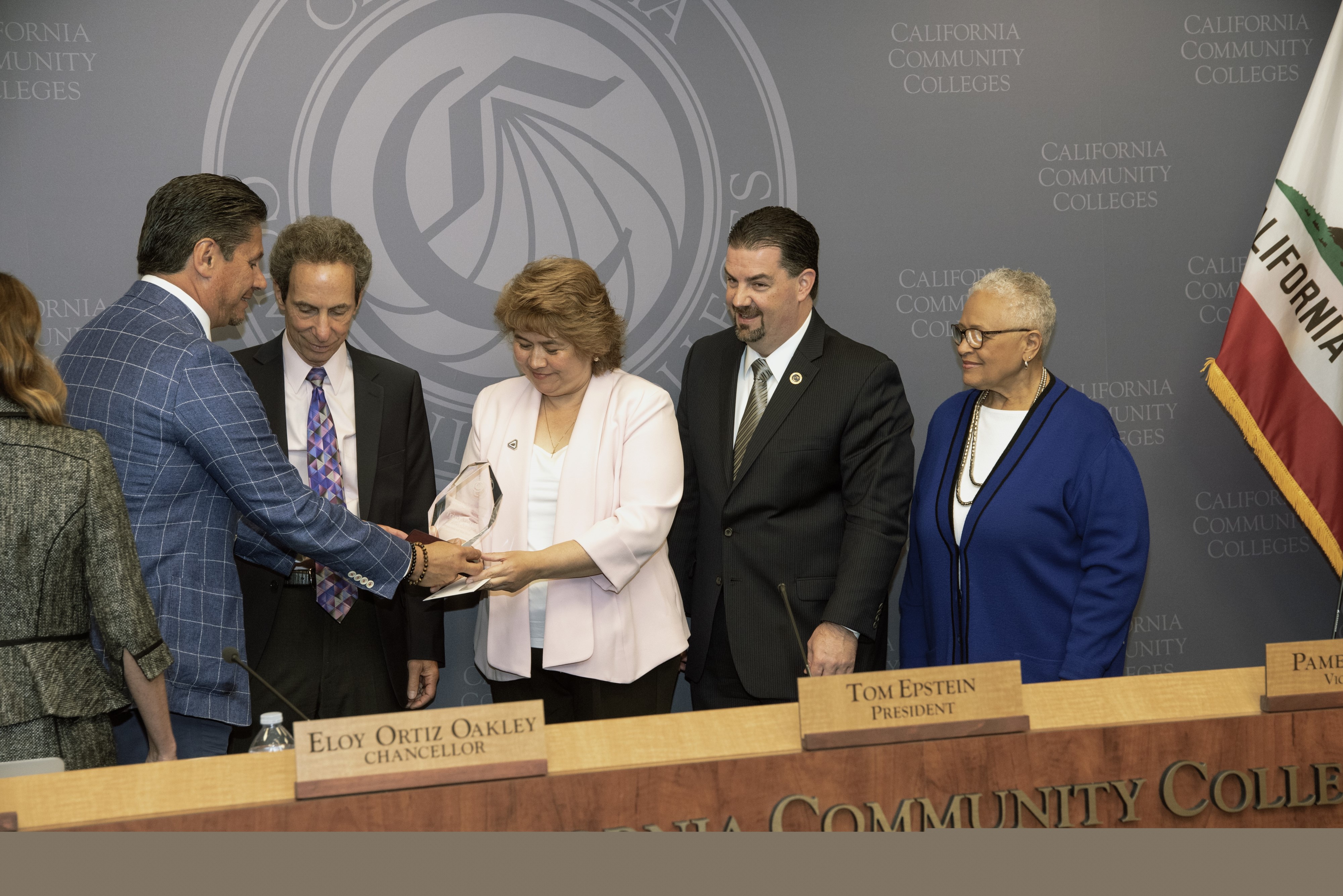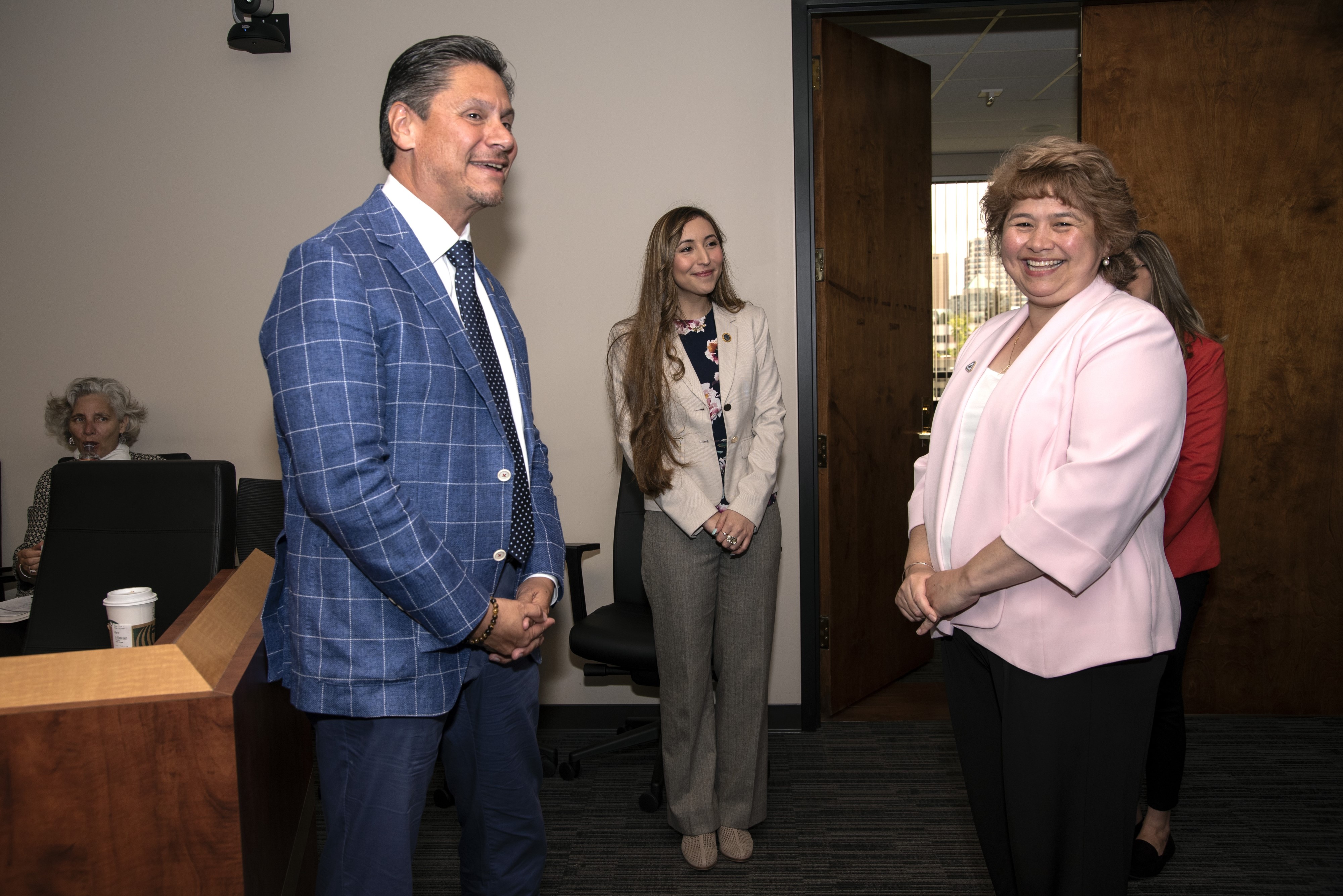
After working in laboratories for 28 years, Trini Araya knows a thing or two about mixing chemicals.
She also knows what happens when you mix young people with a nurturing college environment. They may go on to become doctors, dentists, and pharmacists.
She has the Christmas cards to prove it.
Trini, who has been at Delta for 16 years, was recognized by the Chancellor’s Office recently as a classified employee of the year. It’s the third time in the past four years that a staffer from Delta has received the statewide honor.
Trini’s work starts in the lab, where she prepares equipment and chemical solutions for faculty and students. But she has taken her job much farther than that. Trini serves as a mentor for students through Delta’s Chemistry Club, and has been involved in more than 50 of the club’s popular “magic shows” across the community.
She has formed bonds with students that no chemist could ever dissolve.
Here’s a bit more about Trini in the wake of her big honor.

Trini Araya accepts her award from Chancellor Eloy Oakley. Photo courtesy Julius Hastings
Question: How did you come to Delta?
Answer: “I was working at a private company as a lab technician doing quality control. They moved to China and we got laid off within two or three months. A (Delta) professor who had done an internship there years before said that the College’s lab tech was retiring. Would I be interested? I said, ‘Of course.’
“I came to Delta, and it was fantastic.”
Q: After 16 years at Delta, is it safe to say you prefer working in education?
A: “Education is the best. In education, the priority is to provide students with what they need to learn so they can move on in life. When they come to their first class they don’t even know what a beaker is, and at the end of organic chemistry they know more than I do. It’s a lot of fun to see that.”
Q: What do you do on a day-to-day basis?
A: “During a regular semester we have about 25 labs, from basic chemistry to general chemistry and organic chemistry. My job is to prepare all the solutions, to bring equipment and waste containers to the labs, and to collect any hazardous waste. We have labs that start at 6:30 a.m. and we have labs in the evening.”
Q: That sounds like a lot of work.
A: “It is time consuming. I have two student workers. Some labs have 10 to 15 solutions, so we have to prepare many of them. We try to set up the day before.”
Q: Any mishaps?
A: “We take care of spills unless we feel that it’s beyond our knowledge. So far we’ve been able to handle it.” (laughs)
Q: You’ve also been involved in the Chemistry Club’s many magic shows. What’s that like?
A: “The students are fantastic. It has been the most wonderful thing to work with them. We change the show constantly. They get ideas, they come and talk to me and then we talk to professors. ‘What do you think? Have you done this before?’ The faculty say yes or no. There have been some ideas that were definitely ‘no.’” (laughs)
Q: Does the “magic” ever get old?
A: “No. It’s nice to see new kids. Often in science they are very shy, and speaking in public can be intimidating. When they first join the club they just want to do the demo, they don’t want to talk. By the end of the semester they’re fighting for the microphone. Most of them go on to apply for scholarships and internships. The last couple of years we have seen students do premedical at Davis and Stanford.”

Trini Araya shares a laugh with Chancellor Eloy Oakley. Photo courtesy Julius Hastings.
Q: You estimate that 95 percent of the chemistry club students transfer to universities. What do you attribute that to?
A: “They share the same interest with a big group of people. They study together, they do fun things together. They have even gone to serve meals to the homeless and to help clean up the city. They become friends here and then they continue on.
“One former student is at Harvard doing grad school for chemistry. He’s getting married this summer and all the best men are people he came to Delta with.”
Q: And former students keep in touch with you?
A: “They come by sometimes, during their breaks. When they are professionals they send an email or a postcard. It’s wonderful to see them moving along in life.”
Q: Growing up in Mexico City, you were a first-generation college student yourself. Does that help you relate to Delta students today?
A: “I tell them that I understand, and I usually share personal experiences. If they say they have financial problems, that they cannot go to school because they need to help with the basics at home, I say I understand because I went through that too.
“It’s very difficult, but I tell them that two or three years of sacrifice is going to be better not just for them but for their families. And then, against all odds they continue in school, and now they are engineers and you just say ‘Wow.’”






